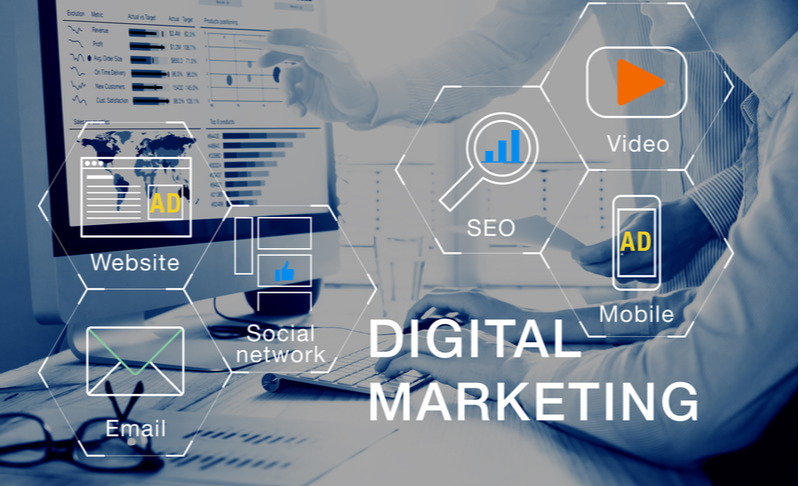With the COVID-19 pandemic confining people to their homes, digital experiences are becoming ever more common than they were before the pandemic’s onset. As a result, digital marketing is growing too. The global digital advertising and marketing industry is projected to reach $786.2 billion by 2026, more than doubling in size in just six years.
This encompasses digital advertising, search engine optimization, content, social media, influencer engagement, virtual events, email, and mobile marketing, to say nothing of the rapid growth in marketing technology, analytics, and other tech-driven areas in the field. The rapid digitization of the past few years has only increased the need for digital marketers. So much so that organizations are now struggling to find qualified and skilled professionals, especially amidst the COVID-19 pandemic and its attendant labor shortages.
In this blog post, we’ll explore a wide range of digital marketing careers. We’ll discuss the roles you could apply for, the skills you need, the opportunities you will have, and more.
What Is Digital Marketing?

Digital marketing—also known as online marketing—uses the internet and other forms of digital communication to promote brands, connect with target audiences, and sell products. It involves a wide range of activities and possibilities. Here are a few things that come under the purview of digital marketing.
- Text, audio, visual, and video messaging
- Multimedia advertising and multi-modal interaction
- Content creation and search engine optimization
- Email and SMS communication, notifications for web/mobile apps
- Social media marketing and influencer engagement
- Virtual events
- Online customer engagement and grievance redressal
- Augmented reality and virtual reality applications
- Marketing analytics
Skills Required To Become a Digital Marketer
Traditionally, a marketer has been a creative communications person—a la Don Draper, for instance—or an administrator who oversees the execution of a company’s marketing. But now, with over 60% of total ad budgets spent on digital, today’s digital marketer also needs to be a creative technologist. As new forms of technology emerge—especially in the fields of artificial intelligence and machine learning—the ‘digital’ and ‘marketing’ elements of digital marketing careers are equally important. Here are some of the most in-demand skills in this changing landscape.
Content Skills

Content is the foundation of digital marketing and is used to attract, engage, and persuade people to take action. For instance, if you’re selling designer shoes, you might create videos that attract a potential customer, explore the product and make a purchase. With this in mind, the following content skills are also immensely valuable:
- Strategy and operational planning
- Ideation and storytelling
- Writing, including a wide variety of blog posts, social media content, video scripts, etc.
- Editing
- Repurposing
Search, Email, And Social Media
It’s not enough to just create great content. You also need to deliver it to the eyes of your potential customers—what’s known as distribution. To do this, you’ll need skills in:
- Search engine optimization
- Search engine marketing/advertising
- Social media marketing/advertising
- Email marketing
- SMS marketing and app notifications
Technology Skills

Technology is a critical part of digital marketing. As a digital marketer, you need to learn skills in:
- Online publishing with tools like WordPress, Squarespace, or other content management systems
- Advertising campaign managers like Google Adwords, Adsense, Facebook Ads, and Twitter Ads
- Email management tools like Marketo and Mailchimp
- Analytical tools like Google Analytics
- Marketing automation that delivers personalized campaigns to your audience
Interpersonal And Strategic Skills
Strong business acumen is essential to advancing your digital marketing career. Some of the most differentiating interpersonal and strategic skills are:
- Design thinking and strategic planning
- 360-degree thinking about the impact of digital marketing on the business
- Creative problem solving
- Taking advantage of viral events and internet trends
- Long-term brand vision and delivering immediate outcomes
It would be impossible for a digital marketer to have all of these skills. So some digital marketers specialize in one or two of these areas, while others are generalists without a specialization. Each of these skill sets has a place in the digital marketing landscape. Let’s look at these roles one by one.
Career Opportunities in Digital Marketing

LinkedIn lists over 270,000 openings for digital marketing jobs, with new ones being added every single day. The animation company Dreamworks, the beer manufacturer Heineken, a children’s hospital in Colorado, and the gaming bigwig Nintendo are just a few who are currently hiring digital marketing professionals. If you’re interested in a career in this field, here are a few digital marketing jobs you can explore.
Digital Marketing Manager
The digital marketing manager is the classic generalist. They plan and oversee the execution of digital marketing initiatives, delegating to specialists. For instance, in an organization running search engine campaigns for lead generation, the search engine marketing (SEM) specialist will execute the campaign itself, while the digital marketing manager will be responsible for setting goals, measuring performance, optimizing results, leading the SEM team, etc.
Typically, a digital marketing manager heads the marketing team and reports to the head or VP of marketing. As part of their everyday tasks, they might also work with a range of external agencies or freelancers for content, advertising, analytics, event management, and so on. Some of their key responsibilities include:
- Setting marketing goals aligned to the business’ goals
- Designing plans for yearly, quarterly, monthly, weekly, and daily activities
- Creating project schedules and timelines
- Planning and managing social media campaigns
- Improving design, traffic, and content on the website
- Managing project budgets
Given the strategic nature of this role, a digital marketing manager needs to have good business acumen, a strong understanding of marketing activities, and some analytical skills. Typically, this role is held by a senior candidate with at least five years of experience. A digital marketing manager earns an average salary of $75,230.
SEO Specialist

A search engine optimization (SEO) specialist ensures that a company’s website and content rank highly on search engine results pages like Google or Bing. They develop SEO strategies that will increase the visibility of their content, drive traffic and generate leads. Some of the tasks they perform are:
- Keyword research
- Content research and tracking trends
- Content planning and creation
- URL and backlinks management
- User experience optimization
- SEO analytics
There are two kinds of SEO specialists—one focuses on content and the other on technical SEO. The content SEO specialist will identify trending topics, create content around those topics, repurpose content, etc. A technical SEO specialist will create backlinks, optimize the website for better search results, etc.
Additionally, most SEO specialists use tools such as Ahrefs (for backlink analysis and URL rankings), Screamingfrog (for web crawling), Google Analytics, SEMrush (for identifying keywords and trends), MOZ (for improving search engine visibility), Google Search Console, etc.
An SEO specialist earns an average of $52,000 a year.
SEM Specialist
While an SEO specialist focuses on organic—as in free—ranking on search pages, the search engine marketing (SEM) specialist manages paid advertisements that accomplish the same goal and strategize ad campaigns across all search engines. Depending on the search engine or display network, these ads can be either text or images. The key responsibilities of this role include:
- Keyword research
- Creating pay-per-click (PPC) advertising strategy including bidding, budget management, performance measurement, etc.
- Writing ad copy
- Optimizing landing pages
An SEM specialist has to be data-driven, analytical, and abreast of trends. They need experience with a wide range of tools like Google Analytics and Webtrends for analytics and MarinOne and ClickEquations for bid management. An SEM specialist makes an average of $54,984 a year.
Email Marketing Manager

As the name suggests, an email marketing manager runs effective email campaigns on behalf of a business, ensuring strong and meaningful customer relationships. Their tasks include:
- Creating and nurturing email databases
- Writing effective emails
- Creating and designing calls to action (CTAs)
- Setting email marketing key performance indicators (KPIs)
- Measuring performance
- Optimizing results
An email marketing manager needs to be familiar with email management tools such as Constant Contact or Mailchimp and other large CRMs. They also need impeccable copywriting, communication, analytical, and project management skills. An email marketing manager makes an average of $80,680 yearly.
Content Marketing Manager
A content marketing manager plans and manages content operations. While a typical content marketing manager might have experience as a writer or editor, this role is more about strategizing content and managing teams. Their role involves:
- Understanding business goals and their content implications
- Building yearly, quarterly, monthly, and weekly plans for content
- Developing and maintaining the editorial calendar
- Ideating for blog posts, case studies, videos, etc.
- Editing and proofreading
- Collaborating with SEO and SEM teams to ensure effectiveness
- Collaborating with the writing and design teams to produce stellar content
A content marketing manager needs three specific kinds of digital marketing skills:
Strategic skills. Digital marketers need to know how content can achieve business goals. They need to have a clear and specific understanding of their brand, the products/services they offer, their target audience, etc.
Content skills. While a content marketing manager might not be a writer or a videographer, it helps to have a background in content creation so that they can guide their team more effectively.
Analytical skills. A content marketing manager needs to have a bird’s eye view of the entire initiative. They need to understand how content is performing across readership, SEO, email, social media, and so on. Typically, they use a range of analytical tools, using the available data to paint a more holistic picture.
Leadership and interpersonal skills. This is a leadership position. So a good content marketing manager also needs great interpersonal, time management, decision-making, and communication skills. The average salary of a content marketing manager is $76,147.
Editor

Editors are content leaders who decide what gets published, whether it’s text, audio, or video.
A content editor reviews and edits content, ensuring that it’s suitable for online publication. For instance, if they receive a blog post, they will proofread it, ensure there are no factual errors, adjust spelling, grammar, and syntax, add hyperlinks, etc. Audio editors will eliminate gaps, adjust sound, add intros and outros, etc. Video editors do the same for video content.
Depending on the kind of content you’re editing, you might need skills in word processing tools, or with image editing software like Adobe InDesign, Adobe Photoshop. Podcasters use editing tools like SoundTrap, Adobe Audition, and GarageBand. Video editors work in InVideo, Adobe Premiere Pro, etc. Editors on content teams need not be proficient in all of these tools. Often, tools like Grammarly for proofreading or Canva for design are sufficient.
An editor makes an average of $57,949.
Social Media Marketing Manager
A social media marketing manager creates and maintains a brand’s online presence, voice, and identity through social media channels like Facebook, Instagram, Twitter, etc. Some of their key responsibilities involve:
- Building social media strategy
- Creating content suitable for each platform
- Publishing and managing content
- Responding to comments and queries on social media
- Tracking viral trends and riding them as appropriate
- Measuring performance and optimizing campaigns
A social media marketing manager needs to understand popular social media platforms. They also need to understand how to use each platform efficiently. It also helps to be proficient in tools like Hootsuite, HubSpot, Buffer, SproutSocial, etc. A social media marketing manager makes an average of $58,016.
Related Read: What Does a Social Media Marketer Do? and Digital Marketing vs. Social Media Marketing
Content Strategist

A content strategist is typically a writer who also devises a long-term content strategy aligning with business objectives and customer needs. Their day-to-day work includes:
- Planning compelling content
- Performing competitor analysis
- Writing, editing, and publishing
- Developing style guides and best practices
- Performing content audits
- Working with the SEO team to optimize content
A content strategist will use tools like SmartDraw (for content planning), BuzzSumo (for benchmarking), UserEcho (for understanding customer needs), and HubSpot (for lead nurturing). A content strategist makes an average of $70,215 a year.
Paid Media Specialist
Businesses are increasingly investing in digital marketing. No wonder paid media needs a specialist. However, it is important to understand that paid media includes more than just advertising. It also includes:
- Identifying publications and portals for advertising opportunities
- Building relationships with influencers for specific campaigns
- Developing sponsorships for virtual events
- Planning contests and engagement activities
- Creating a combination of online and offline activities for better outcomes
- Measuring performance and reassigning budgets to successful campaigns
Depending on the roles and responsibilities, a paid media specialist might need different skills. For instance, if the role is heavy on search, display, and social advertising, they need to be proficient in Google Ads, Google Analytics, Google Tag Manager, MS Excel, Powerpoint, and various marketing automation systems. If the role focuses on influencer marketing, they need skills in social media, interpersonal relationships, storytelling, video engagement, etc.
A paid media specialist makes an average of $56,086 a year.
Copywriting

A copywriter writes short copy. While a content writer writes long-form blog posts and case studies, a copywriter writes headlines, banners, product descriptions, taglines, ads, emails, video scripts, etc. They tell stories succinctly, in a way that grabs the viewer’s attention. This role involves:
- Knowing the audience
- Interpreting briefs
- Writing clear copy that reflects the brand voice
- Building a strong and differentiated brand identity
Copywriters need to have a way with words. It also helps to monitor the latest trends, industry jargon, emerging language, etc. A copywriter earns an average salary of $64,348 a year.
Data Analyst
Data analysts are marketing professionals too. With the data created by marketing campaigns, a data analyst is essential. To improve the effectiveness of a campaign, they organize, explore and interpret internal and external data. Their key responsibilities include:
- Collecting the right data
- Analyzing data and interpreting results
- Creating dashboards, data visualizations, and website performance reports
- Presenting learnings to business and marketing teams
- Conducting competition research
- Identifying opportunities to improve campaign performance
A marketing data analyst is often expected to have an undergraduate degree in mathematics, statistics, computer science, or other related fields. They also need skills in various marketing analytics tools like Google Analytics, SEMrush, Mixpanel, Optimizely, Klipfolio, etc. It is certainly a bonus if you also have basic programming skills in SQL or Python. A data analyst earns an average salary of $82,847 a year.
Digital Marketing FAQs
Is Digital Marketing In Demand?

Yes. Opportunities in the digital marketing field are numerous and on the rise. LinkedIn put digital marketing as one of the in-demand jobs in 2021. The top roles it identified are:
- Digital Marketing
- Specialist Social Media Manager
- Marketing Representative
- Search Engine Optimization Specialist
Estimated salaries are in the range of $48,000 – $96,000, with some availability for remote jobs as well.
Is Digital Marketing a Good Career? Who Can Opt for a Career in Digital Marketing?
Yes, it is a great career. With more opportunities available every day, digital marketing salaries are on the rise too. As an entirely digital role, you have the opportunity to work from home or remotely. From startups and mom-and-pop shops to multinational enterprises, there is a wide range of digital marketing roles available to choose from. As the industry itself evolves, you will have the opportunity to grow quickly and steadily.
LinkedIn finds that 94% of marketing hires have a bachelor’s degree or higher. However, few universities currently offer the specializations needed in the industry. Therefore, early career professionals often supplement their college education with digital marketing bootcamps or certificate programs.
Is Digital Marketing Easy To Learn?
There are plenty of resources to teach you all you need to know about digital marketing. And there are also dedicated certification programs that will give you the foundation you need to kick start your digital marketing career. At Springboard, you will also complete small hands-on projects, build your own capstone project for your portfolio, and have one-on-one mentoring to transition you into your career.
Since you’re here…
Want to bring your marketing skills into the 21st century? Check out our free digital marketing curriculum for new ideas and insights.



